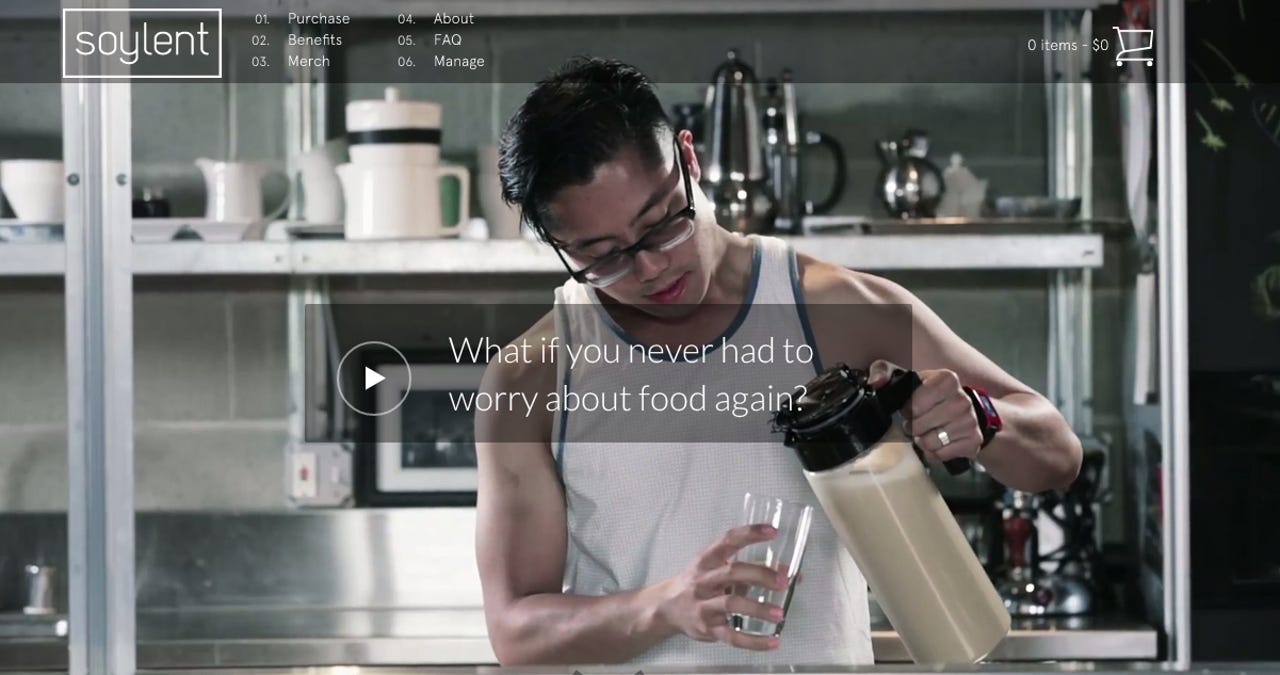Why you should be skeptical of Soylent, the food replacement product


Update: See what Soylent creator Rob Rhinehart had to say about the study, at the bottom of this post.
It's a tempting proposition: drink Soylent, a food-replacement product that gives you all the calories and nutrients you need to go about your too-busy-to-cook day. It can save time and reduce your agricultural footprint. But is replacing real food with powdered nutrients a good idea for your health?
Surprise! It's an idea that might be too good to be true.
In a study published earlier this month in the journal Life Sciences, researchers from Tohoku University tested the effect of "powdered food" (compared to "normal pellet food") on mice over three days and 17 weeks. The researchers looked at key health indicators, like blood glucose levels, blood pressure, and social interaction behaviors. The results? The mice living on powdered food exhibited "signs of systemic illness," such as hyperglycemia, high blood pressure, and abnormal behaviors. Medicine typically given to patients with type 2 diabetes did help improve these symptoms. (Maybe Soylent should throw some liraglutide into its recipe.)
The problem with Soylent is that it might have overlooked an important process in eating: chewing food. As the researchers put it: "Mastication of food of adequate hardness may be very important for the maintenance of systemic (physical and mental) health, possibly via reduction in the levels of blood glucose and/or adrenal stress hormones (catecholamines and glucocorticoids)." In other words, chewing food, not just drinking nutrients, is important to our health.
To be clear, the study did not specifically test the Soylent product, or say how closely related its "powdered food" resembled Soylent. But it does raise some red flags about food replacement products like Soylent. What this tells me is that, at the very least, Soylent needs more independent studies looking into the possible health impacts. (I, for one, don't plan to be the guinea pig.)
But why focus on Soylent in relation to this study and not other nutrition drinks (which have their own health concerns), like Ensure, protein shakes, or those big tubs of nutrient powders you might find at a GNC? Because those are supplements. Soylent is overtly branding its product as a food replacement product.
As Rob Rhinehart, Soylent's creator, told SmartPlanet earlier this year, Soylent is regulated by the U.S. Food and Drug Administration as a food (it has its own nutrition label). "The design of Soylent is to act as a food," he said. "Soylent gives you all the calories that you would need in a day in order to be very active and focused and sharp."
The company's website asks the rhetorical question: "What if you never had to worry about food again?" Implying, essentially, that you could live off the colorless, liquid food drink. And maybe you can. The company's founder did. And Popular Science, after talking with nutritionists about Soylent, said "it's also probably okay for you. Throughout history, humans have survived on worse." It's just not clear, at this point, if one of the benefits of drinking Soylent as your only, or main, source of food will be improved, or at least sustained, health.
In a less-than-glowing review of Soylent in the New York Times, Farhad Manjoo reports that the company is conducting a "large study" of Soylent but Rhinehart declined to go into details. So far, Manjoo writes, "the firm has not performed any large-scale studies to show that drinking Soylent over an extended period of time is good for you, or even that it's not bad for you." Right now all we have to go on regarding the health implications of Soylent are anecdotes.
Still, people are buying into the idea. Soylent raised $800,000 in a crowdfunding campaign last June and another $1.5 million in seed investment last October. As of January it passed $2 million in orders and earlier this year the company began shipping the product. But why anyone would replace their meals with something that hasn't been thoroughly tested for health impacts is beyond me.
Then again, we know the health implications of drinking soda but we still drink a lot of it.
Soylent didn't respond to SmartPlanet's request for comment on the study. We'll update the post if we hear anything.
Update: Rob Rhinehart, Soylent's creator, responded to the study in an email to SmartPlanet. Here's what he had to say:
The study is interesting and definitely worth reporting on. However, I think it is somewhat misleading to label the mouse food "soylent-style".
Obviously not all powdered foods are identical. This study specifically demonstrates (in the first part) that the powdered version of the mice's food is more quickly digested and absorbed. In other words, the glycemic index is higher, which would explain the systemic health effects. Soylent is deliberately designed to be easily, but not quickly, absorbed. Our medical adviser, Dr. Xavier Pi-Sunyer is a world expert in metabolic disorders and worked with us to design a food that would be low glycemic index and healthy even for diabetics.
While we tested in-house using WHO guidelines to quickly verify a low GI, we are refraining from reporting on our specific GI until 3rd party testing is completed, which began about a month ago. Once we have this value we will release our study.
He went on to say "I have no concerns that the results of this study are relevant to a Soylent diet."
Image: Soylent.me
Related on SmartPlanet:
- Q&A: Rob Rhinehart, creator of Soylent, on super-fast food
- Soylent raises $800,000 for food replacement product
- Q&A: The future of our food: flavored vegetables, cricket powder, and violet water
- Organic food competition is driving down prices
- Step aside, coffee maker. Make room for the wine machine.
This post was originally published on Smartplanet.com